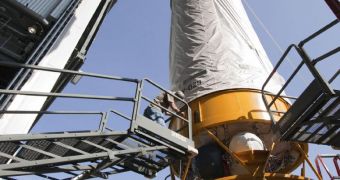Officials at the American space agency announce that they are about a month away from the time when the first launch window for the Jupiter-bound Juno spacecraft opens. When this happens, the team will have about 22 days to send the rocket carrying the orbiter in space.
Planets in the solar system are not always in a perfect configuration for sending spacecraft from one to another efficiently, and without requiring massive amounts of fuel. The launch window for Mars, for example, lasts for about a month, and comes once every 26 months or so.
There are numerous things to be considered when calculating the orbit that a satellite must take in order to reach its destination. Even the orientation of the launch pad from which the vehicle will take off is extremely important, and needs to be accounted for.
Other factors that experts need to consider is the mass of the payload and the rocket itself, how much fuel the delivery system carried, as well as where Earth and Jupiter (in this case) are located in respect to each other at the time of launch.
A United Launch Alliance (ULA) Atlas V rocket will carry Juno, NASA experts say. Take off will take place from the Space Launch Complex-41 (SLC 41), at the Cape Canaveral Air Force Station (CCAFS), in Florida. The installation is next door to the NASA Kennedy Space Center.
“One month from today, our first launch window opens at 11:34 a.m. EDT (8:34 a.m. PDT) and lasts 69 minutes. Our primary launch period is 22 days long, and so if weather or other issues come up on August 5, we have 21 more days to get Juno flying,” Jan Chodas explains.
“Once we get Juno into space, it's a five-year cruise to Jupiter. The launch window is the length of time allotted every day for an attempt to launch the spacecraft,” adds the expert, who is the project manager for the Juno mission.
“The launch period is the period of time in days when everything is in the right place to get your mission off to the right start” Chodas says. He holds an appointment at the NASA Jet Propulsion Laboratory (JPL), in Pasadena, California.
The JPL manages Juno as part of the New Frontiers Program, which is led by experts at the NASA Marshall Space Flight Center (MSFC) in Huntsville, Alabama. The principal investigator of the mission is Southwest Research Institute (SwRI) expert Scott Bolton.

 14 DAY TRIAL //
14 DAY TRIAL //